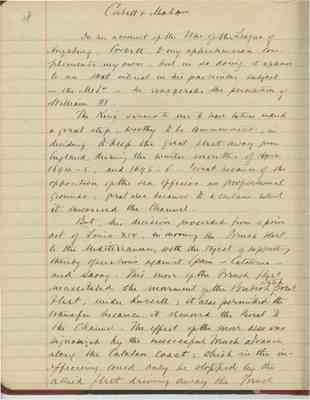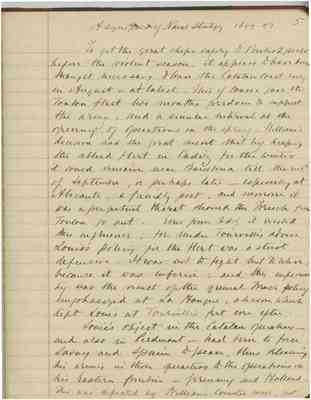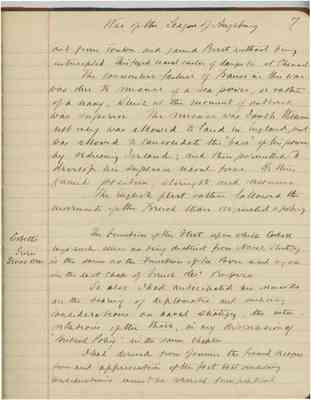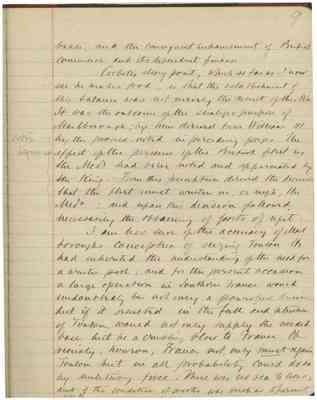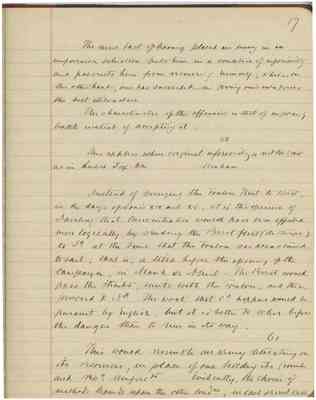Pages That Need Review
Research notes: Data for naval strategy lectures, circa 1907-1914
[MANUSCRIPT COLLECTION U.S. Naval War College]
Ms. Coll. 17
MAHAN, ALFRED THAYER
Papers: Notes, etc., for naval strategy lectures. [1907 - 1911]
71-4
Vol. 13
Data for Naval Strategy Lectures
4 Corbett + Mahan In his account of the War of the League of Augsburg, Corbett, to my apprehension complements my own; but in so doing it appears to me that interest in his particular subject -the Medr- he exaggerates the perception of William III The King seems to me to have taken indeed a great step, worthy to be commemorated in deciding to keep the great fleet away from England during the winter months of 1694-5 and 1695-6. Great because of the opposition of the sea officers on professional grounds; great also because to a certain extent it uncovered the Channel. But his decision proceeded from a prior act of Louis XIV, in moving the French fleet to the Mediterranean with the object of supporting thereby operations against Spain- Cataloniaand Savoy. This move of the French fleet necessitated the movement of the British Dutch Great Fleet under Russell; it also permitted the transfer because it removed the threat to the Channel. The effect of the move also was signalized by the successful French advance along the Catalan coast; which in the inefficiency could only be stopped by the allied fleet driving away the French
A synopsis of Naval Strategy 1689-97 5
To get the great ships safely to British ports before the violent season, it appears to have been thought necessary to leave the Catalan coast early in August- at latest. This of course gave the Toulon fleet two months freedom to support the army and a similar interval at the opening of operations in the spring. William's decision had the great merit that by keeping the allied fleet in Cadiz for the winter it could remainnear Barcelona till the end of September or perhaps later- especially at Alicante, a friendly port; and moreover it was a perpetual threat should the French from Toulon go out. Even from Cadiz it exerted this influence; for under Tourvilles' advice Louise' policy for the fleet was a strict defensive. It was not to fight but to return; because it was inferior; and their inferiority was the result of the general French policy emphasized at La Haugue a lesson which kept Louis at Tourville's feet ever after. Louis's object in the Catalan operationsand also in Piedmont - had been to force Savoy and Spain to peace, thus releasing his armies in those quartes to the operations in his Eastern frontier- Germany and Holland. This was defeated by Williams counter move; but
War of the League of Augsburg 7 out from Toulon and gained Brest without being interrupted. This taxed naval cente of danger tc at Channel. The consecutive failure of France in this war was due to misuse of a sea power, or rather of a navy, which at the moment of outbreak was superior. The misuse was double William not only was allowed to land in England but by reducing Ireland; and then permitted to develop his superior naval force. He then gained position, strength and resources. The English fleet rather followed the movements of the French than originated a policy
9 and the consequent enhancement of British commerce and its dependent finance Corbett's strong point, which so far as I now see he makes good, is that the establishment of this balance was not merely the result of this War. It was the outcome of the strategic purpose of Marlborough; by him derived from William III by the process noted in preceding pages. The effect of the presence of the British fleet in the Medr had been noted and appreciated by the King. From this perception derived the decision that the fleet must winter in, or nigh, the Medr; and upon this decision followed necessarily the obtaining of ports of refit. I am less sure of the accuracy of Marlboroughs conception of seizing Toulon He had inherited the understanding of the need for a winter port; and for the present occasion a large operation in Southern France would undoubtedly be not only apoewrful diversion but if it resulted in the fall and retention of Toulon would not only supply the needed base but be a crushing blow to France. Obviously however, France not only must regain Toulon but in all probability could do so by military force. There was no sea to cross; and if the condition of works was such as operant
17 The mere fact of having placed an enemy in an unforeseen situation puts him in a condition of inferiority and prevents him from recovering himself; while on the other hand, our has succeeded in giving one's own forces the best utilization. The characteristic of the offensive is that of imposing battle instead of accepting it. 58 This applies when original inferiority is not too great as in Russo Jap War Mahan Instead of bringing the Toulon Fleet to Brest in the days of Louis XIX and XV, it is the opinion of Davelney that concentraion would have been effected more logically by sending the Brest fleet (the stronger) to Ja. at the time that the Toulon was accustomed to sail; that is, a little before the opening of the campaign, in March or April. The Brest would pass the straits, unite with the Toulon, and then proceed to N.r The worst that c.d happen would be pursuit by English, but it is better to retire before the danger than to run in its way. 61 This would resemble an army retreating in its resources in place of one holding its ground and rec.d reinforct.s Evidently the choice of methods depends upon the other cond.ns in each seized case


